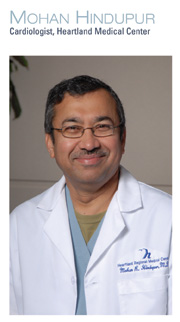
Mohan Hindupur’s career in cardiology was rooted in personal loss. “My father,” he says, “died of a massive heart attack.” Hindupur’s journey to fight back against coronary illness began with medical school in his native India, where he finished first in his class earning both his undergraduate and master’s degrees.
His post-graduate training and rotating internships put him on a path to America, and he arrived in 1975 for an internship at Columbia Hospital in Chicago. Hindupur followed that up with joint residency and fellowship through Northwestern University and Columbia, earning honors as the hospital’s Best Intern of the Year in 1976. Then, after 12 years in Chicago, Hindupur made the move to Missouri by joining St. Joseph Cardiology in 1987.
Since 2000, he has been with Heart-land Cardiovascular Consultants, a division of Heartland Health, and he splits his time nearly equally between the system’s Heartland Regional Medical Center and clinic.
From the time he placed a stent in a critically ill patient and saw the life-saving difference he was making as a doctor, Hindupur knew he had made the right choice of career track. But it was the ethic he brought to the task, balanced by the warmth of his personality, that has made him both a commanding and endearing presence within the Heartland system.
Asked what he thought other physicians would have seen in him that compelled his recognition as a Top Doctor, Hindupur simply says: “Hard work,” but those who work with him also cite his sense of humor, the high level of compassion he brings to a field where it’s often needed, and the depth of his involvement in clinical process improvements.
Hindupur, who tries to get free for an occasional tennis match to help relieve the demands of his career, says the influences of both his mother and his wife have complemented his education and experience to make him the doctor he is today.

“Treating chronic pain,” says Rich Morgan, “is the most humbling task I’ve ever undertaken. It is complex and per-sonal. I continue to struggle with the interplay between pain and suffering.” The two are clearly intertwined, he says, “but treating physical pain alone doesn’t always address suffering,” and pain, in turn, can’t always be eliminated. Thus, managing pain and living life as fully as possible become the focus of care, he says.
Those vexing issues have drawn him into a new area of specialization after a career largely devoted to anesthesiology. “I found that pain management required all my energy as I also became more invol-ved in hospice and palliative care over the last 10 years,” he said. So he left the practice of anesthesia in 2007 to concentrate full-time on pain management and palliative care. “I am not sure how I chose the specialty,” he muses. “It may have chosen me.”
He’s now the medical director of the Pain Clinic at St. Joseph, but also logs time at Menorah and Cass Regional medical centers, and he’s medical director for Grace Hospice. His interest in medicine started at home, back in Emporia, Kan., where his father was an internist and an inspiration, “fiercely dedicated to the profession of medicine and the role of the physician,” Morgan says. “I think I was intimidated by that sort of dedication and it kept me from deciding on medicine until the last moment.”
Medical school at the University of Kansas and residency at Saint Luke’s Hospital preceded a fellowship in pain management and critical care at the Mayo Graduate School of Medicine and, almost in tandem with that, marriage to Karin Ann Morgan. Three children later, Morgan has found anchors in both his home and work life. “I draw inspiration from so many remarkable patients who have shown me how to manage pain with grace and strength; I try to pass some of that along,” he says. “The relationships I have established over the years with patients and families are the best part of my job, and I think that goes both ways.”